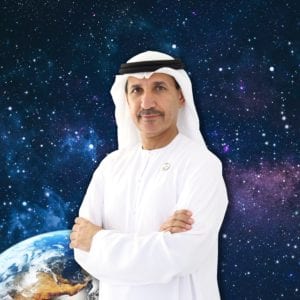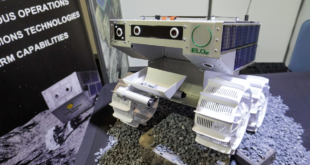
By His Excellency Dr. Eng. Mohammed Nasser Al Ahbabi
Along the sidelines of local and international events, my colleagues and I at the UAE Space Agency meet with a myriad of official delegations and representatives to discuss opportunities for cooperation and the state of the global space sector. Our discussions encompass a wide range of topics including space activities, staff training, and knowledge exchange in addition to agricultural, scientific, legal and environmental subjects. Upon the conclusion of every meeting, our international counterparts are often surprised and left with a resounding impression – the UAE’s space sector is comprehensive and continuing to grow at an unprecedented pace, unmatched within the region.
If we talk merely about services and space projects—the UAE has a lot to offer. In terms of infrastructure, we have developed an advanced system that supports current and future space missions and projects. If we talk about policy, legislation and regulation—our space sector is governed by a comprehensive legal framework incorporating the highest international standards. In the areas of education and knowledge exchange, we have some of the best research centers, universities, specialized entities, and space science institutions in the Middle East.
When discussing space services we are proud to highlight the UAE’s extensive satellite network, a nationally owned and operated system that spans all corners of the globe, reaching even the most remote areas. Al Yah Satellite Communications (Yahsat), for example, provides multi-use solutions to customers around the world, including Internet, TV broadcast, and communications services across the Middle East, Africa, Central and Southwest Asia, and Brazil, along with other commercial services in more than 64 countries.
Its subsidiary, Thuraya Satellite Communications Company, is responsible for one of the most advanced mobile-satellite services (MSS) on the planet, providing high-fidelity communications and uninterrupted coverage across two-thirds of the world.
Likewise, the UAE’s space exploration projects are second to none in the region. Our ambitious projects include the Emirates Mars Mission, led by the Mohammed bin Rashid Space Center (MBRSC) and recognized as the first Arab and Islamic interplanetary mission; the settlement of the Red Planet as outlined by the Mars 2117 Project; and Mars Science City which aims to simulate the planet’s environment to facilitate further study of its conditions. And, of course, the UAE Astronaut Program which sent the first Emirati to the International Space Station (ISS) last year.
In 2018, we celebrated the launch of KhalifaSat, the first satellite built in the UAE and the first to be developed entirely by a brilliant and dedicated team of Emirati engineers at MBRSC. In contrast to the commercial satellites operated by Yahsat and Thuraya, KhalifaSat is a remote sensing Earth observation satellite dedicated to providing high-resolution imagery for use in urban planning, area classification, environmental monitoring, research and analysis, as well as aiding relief efforts during natural or man-made disasters.
All these projects, programs and commercial ventures fit within the carefully developed structure of our national space sector. The level of organization within the sector again sets us apart from our regional neighbors and even rivals that of established spacefaring nations.
The sector is guided by our National Space Policy, adopted in 2016, and our recently-approved National Space Strategy, which outlines our long-term goals for the sector and the means by which to achieve them. In addition, our Space Law, which is the first of its kind in the region, provides the necessary regulatory oversight to ensure the sector continues to operate in accordance with the highest standards of safety, security and quality.
A key contributor to the success of our space sector are the UAE’s prestigious institutions of higher learning, including the Sharjah Center for Astronomy & Space Sciences at Sharjah University, the National Space Science and Technology Center (NSSTC) at United Arab Emirates University (UAEU), and the Yahsat Space Laboratory at the Masdar Institute Campus in Khalifa University (KU).
In addition, collaborations with organizations such as NASA for the International Internship Research Program and Khalifa University along with Boeing Corporation, for a STEM oriented contest called UAE Mini Satellite Challenge, push the youth in our region to strive higher and push their limits.
The rapid growth and methodical organization of our native space sector will no doubt be the subject of in-depth discussions by experts from around the world who are gathering in Abu Dhabi on 17 -19 March 2020 to participate in the Global Aerospace Summit. All of us at the Agency are looking forward to meeting with global experts and discussing the latest trends, opportunities and challenges present throughout the sector. The Summit itself, as one the largest gatherings of aerospace leaders in the Middle East, will showcase our leading position regionally and our growing international presence.
His Excellency Dr. Eng. Mohammed Nasser Al Ahbabi is the Director-General of the UAE Space Agency.
This SpaceWatch.Global exclusive feature will not be shared with any other publication or in any other language.
 SpaceWatch.Global An independent perspective on space
SpaceWatch.Global An independent perspective on space




